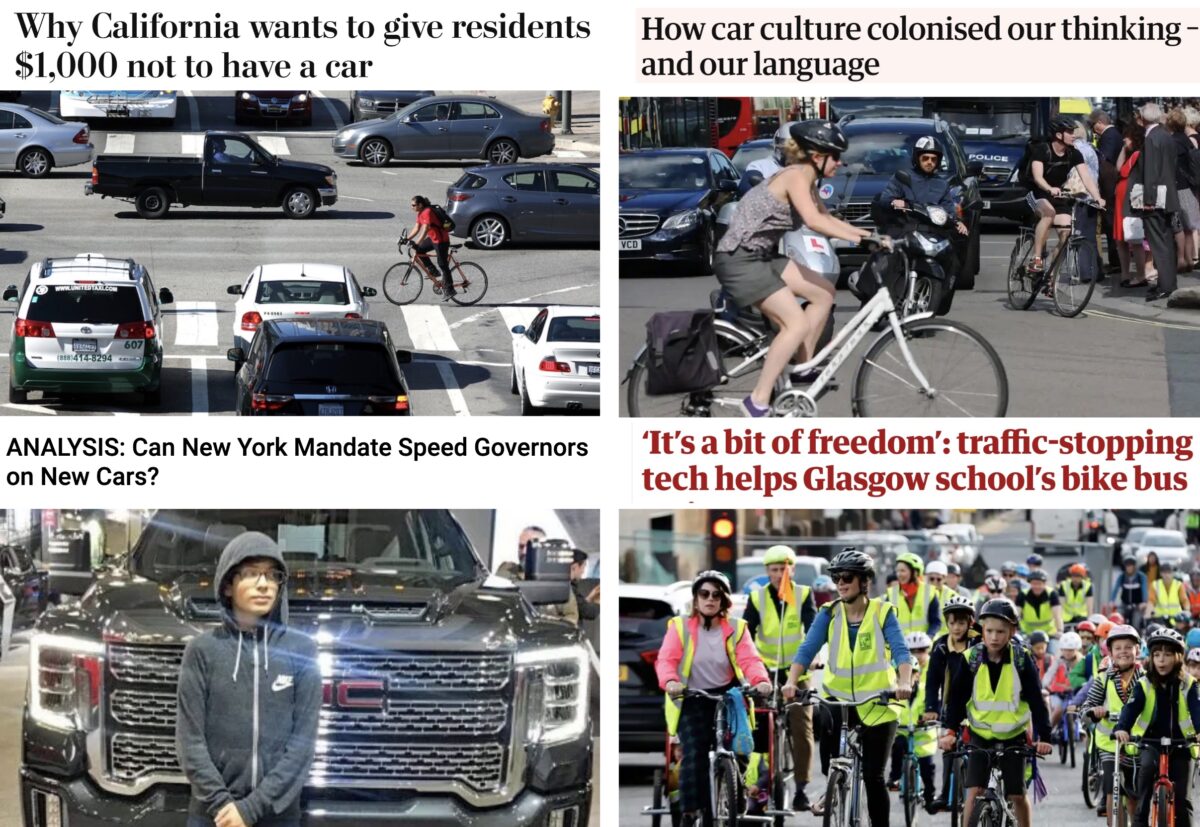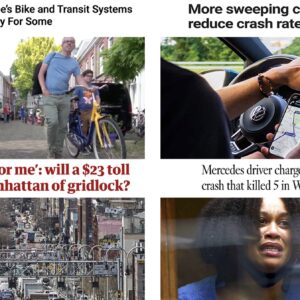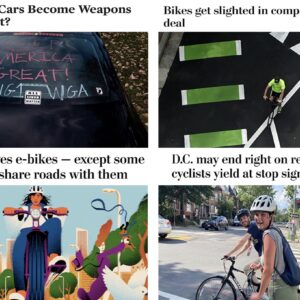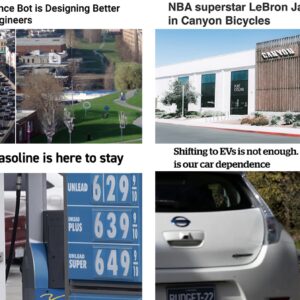Welcome to the week.
Here are the most notable stories our writers and readers came across in the past seven days…
Better than corkers: A bike bus in the UK has been given permission to use signal-altering technology to allow all the students to safely get through the intersection. (The Guardian)
Bad habit: I have always loved the framing of “driving is the new smoking” and now someone has written an excellent breakdown of why this is such an apt metaphor. (Greater Greater Washington)
This article is a monstrosity: A writer forgot to leave his personal biases at the door when he sat down to write an article about e-bikes that should have been labeled an op-ed. (The Atlantic)
Carfree subsidy: Tucked inside California’s wide-ranging suite of new policies to address climate change is a $1,000 tax credit for people who live without a car. Yes, the state is paying people to not drive. (Washington Post)
Regulating cars and trucks: In the effort to level the power dynamic on our streets, what’s happening in New York state with speed limiters and truck/SUV design regulation legislation is one of the most interesting issues to watch. (Streetsblog NYC)
Car danger doc: “Part of the film’s message to non-wonks is that car culture has been so firmly embedded in the US — in its collective consciousness, its physical infrastructure, and in the language itself — that we rarely consider how it got there,” writes a review of a new PBS documentary on traffic safety. (Bloomberg)
Car-speak: We cannot unseat the dominance of cars until we understand how pervasive their influence is on our lives. This article is a great introduction to a new book that demonstrates how the windshield perspective has “colonised our thinking.” (The Guardian)
Parking and biking: We cannot created truly bike-friendly cities until we get the parking monster under control, says Portland’s own Tony Jordan and Catie Gould! (People for Bikes)
Idaho Stop, but for walking: California’s Freedom to Walk bill would do for walkers what the Idaho Stop did for bikers: Decriminalize behaviors that are natural and safe and only exist as traffic violations because of our misguided prioritization of drivers over everyone else. (California Bicycle Coalition)
Be careful what you campaign for: A mayoral candidate in Winnipeg pledged to reduce bike theft, then got his bike stolen shortly thereafter. (CBC)
Thanks to everyone who sent in links this week!







Thanks for reading.
BikePortland has served this community with independent community journalism since 2005. We rely on subscriptions from readers like you to survive. Your financial support is vital in keeping this valuable resource alive and well.
Please subscribe today to strengthen and expand our work.
I read that Atlantic article earlier last week and thought it was one of the dumbest things I’ve ever read from them. Through most of it I thought it was satire, but then I realized the writer was serious.
“Should have been labeled an op-ed”
The Atlantic is not a news magazine; it is long form analysis and opinion pieces. By being published in the magazine, it was implicitly labeled op-ed.
Thanks. Good point.
That’s kinda true, Watts. But remember that The Atlantic influences a lot of important thinkers, so when the mag runs a completely unhinged piece about e-bikes, a lot of powerful people will get into their BMWs and think “E-bikes are rubbish – good thing I’m driving a car.”
I have entertained very similar thoughts when reading articles gushing about ebikes on this website.
I read that article too a few days ago and thought that it bordered on journalistic (okay, opinion-istic) malpractice. My takeaway is that ebikes obviously give Mr. Bogost cognitive dissonance – but that’s his problem, and he shouldn’t assume that just because he can’t grok ebikes doesn’t mean that nobody else can.
This article is par for the course of at The Atlantic. It’s probably best just to avoid their stuff altogether, as there is really no filter for the author’s weird opinions and hangups. This e-bike one is just a particularly egregious example.
I got passed on Clinton by this morning by someone riding an e-something that looked a lot like a bike, but had no pedals. There’s a lot we all need to figure out.
As awful as I found the writing, the author has a point: many e-bikes are neither fish nor fowl. Too powerful for infrastructure designed originally for HPV’s, too vulnerable for the open road (for most folks).
This is a follow up to the Atlantic Article on e-bikes from Vice, and actually contains some more substantive criticisms, mostly about lack of infrastructure for e-bikes.
https://www.vice.com/en/article/88q54x/america-has-an-e-bike-problem-that-cant-be-solved-with-more-e-bikes
This is great follow article, thanks for posting:
“E-bikes don’t belong anywhere in particular on American infrastructure, which makes them both more frustrating, more dangerous, and more annoying than they otherwise could be. And it’s unnecessarily generating friction between traditional cyclists and e-bikers despite their obvious shared interests in repurposing street space from automobiles.
Before I go any further, I want to be abundantly clear that the problem is not the electric devices themselves or the riders who use them. Electric bikes are good and e-riders are no better or worse than anyone else. But, to Bogost’s point, e-bikes are new and different and (mostly) cannot be shoehorned into our existing and already inadequate infrastructure. “
Link to the PBS Street Project Documentary: https://www.youtube.com/watch?v=QjseFSvqwBY
I took three things from The Atlantic article:
With a handle like Fred I’m not surprised you focused first on the cost/quality of the e-bike in question. IMO the bikes most people ride are often inexpensive lower-end machines and I don’t mean stolen. Even a low-end pedal or e-bike can be made to work adequately well with a few mechanical skills/tweaks. To borrow a meme from the autoheads, you don’t need a Mercedes when a Ford will do.
I bought a really inexpensive road bike to turn into my town bike (a 1×7). I’m an adequate bike mechanic – there were so many things wrong with that bike that it’s unreal. I basically had to disassemble it and rebuild it properly.
Most people don’t have that skill set and when combined with the extra complexity and power of an electric motor, build quality is going to be a problem in this segment.
I like the article on Car Speak for highlighting the importance language has in framing our reality. I think we would encourage more folks to give up driving if we stopped saying our streets are dangerous. Now obviously people die or are injured every day on our roadways and that’s tragic, but if compared to other life threatening events such as Obesity, Environmental degradation and Social Isolation it’s becomes obvious it’s not that big of a risk. We should highlight the role each individual has on building a healthy sustainable community. Show them how to overcome their fears and take the actions necessary to change our infrastructure from the ground up. As I’ve said before clogging the streets with active transit users is the most effective way to elicit change in policy from above. I see many empty bus seats, bike lanes and sidewalks in my travels. How can we justify more spending if people are to scared to use what we got now?
Agreed Jay Resse, but the City is not fulfilling its half of the Civic compact: If we are expected to live in samller, denser houses, and use mass transit or bikes, the City must provide direct, safe routes for cycling, reliable transit, and clean and safe parks. Out transit is unsafe, our cycling network is ineefective becuase of dangerous gaps along every route, and our parks are no longer clean or safe. We have a safety issue: poor driving, guns and campers. If our progressive-ish leaders don’t do something effective, we are going end up with Giulianai-style, tough on crime leaders like Betsy Johnson- which is very likely to mean less $$ for bikes and transit. I know is is uncomfortable to ask the police to enforce more traffic laws, or to force campers into shelters and treatment, but I think it it will much more palatable than “tough love” solution from Johnson.
I like cars, in their place. In fact I have been working at building a car the past several years, but I still would like to see them severely restricted from most urban and some suburban areas, with public transit taking up the demand for transportation. My car build is for a street-legal car I can use in SCCA Solo Racing.
I would like there to be taxes and fees assessed to cars that the revenue collected be used to expand transit, and make other modes more inviting like protected bike and bus lanes and wide sidewalks.